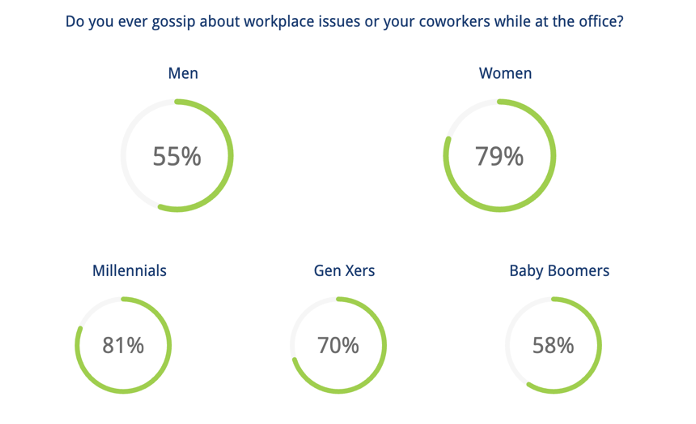As someone who works in a team or leads a team, you have probably heard that gossip is always negative.
It should be avoided at all costs…
Gossip is defined by the Oxford dictionary as “Casual or unconstrained conversation about other people.”
And Dave Ramsey, a welll-known financial expert, has been outspoken about the “No-Gossip” policy for his people at Entreleadership – for them it has been a significant part of defining their culture.
However, there is recent research that has shown gossip can actually have positive effects on team morale, culture, and performance.
And according to a recent study by OfficePulse, gossip is alive and well in a majority of workplaces. In fact, they report that “72% of business professionals admitted to gossiping about workplace issues or coworkers while at the office.”
Here is how their research is broken down by gender and age group:

Surprisingly, though, there is a growing amount of research that has suggested gossip is not all bad…
Here are some reasons why workplace gossip might be a good thing for your team.
Gossip can serve as a way to prevent negative consequences.
According to research by social psychologist Robb Willer, the most generous and moral individuals are most likely to pass on rumors about untrustworthy people, and they do so because they are concerned about the well-being of others.
This means that gossip can be used as a way to warn coworkers about suspicious behavior and prevent negative consequences from occurring.
To avoid spreading negative rumors or unfounded gossip, it’s essential to ensure that the information being shared is based on facts and not on speculation. Additionally, it’s important to make sure that the information being shared is relevant to the team’s work and is beneficial for everyone involved.
Gossip can build trust and belonging among team members.
Gossip can be used as a way to start a conversation and build a relationship with a coworker. When employees gossip together, it can create a sense of belonging and solidarity within the team, which can lead to improved morale and team culture.
However, according to the same research study that suggests gossip can have a positive impact on workplace teams, it’s important to ensure that the gossip being shared is not malicious or intended to harm someone’s reputation.
To build trust and create a positive workplace environment, team members should only share information that is relevant, respectful, and beneficial to everyone involved.
Gossip can keep selfish and immoral individuals in check.
According to a study by Matthew Feinberg, a professor of management at the University of Toronto, individuals who behave selfishly or immorally are much more likely to have people gossip about them so that everyone else in the larger group knows about their behavior. This helps to keep such individuals in check and ensures that everyone in the team is working towards the same goals.
However, it’s important to ensure that the gossip being shared is not intended to harm or ostracize someone. Instead, team members should use gossip as a way to encourage positive behavior and discourage negative behavior.
Gossip can be a way to bond and build relationships within the team.
There is a 2018 research study that actually states humans cannot live WITHOUT gossip.
When employees gossip together, it can create a sense of camaraderie and help build stronger relationships within the team. This can lead to improved communication, collaboration, and performance.
Of course, it’s important to ensure that the gossip being shared is not harmful or malicious. To build positive relationships and foster a healthy team culture, team members should only share information that is respectful, relevant, and beneficial to everyone involved.
However, it’s important to ensure that the gossip being shared is respectful, relevant, and beneficial to everyone involved.
And that is often where the problem lies…
So – IF Workplace Gossip HAS become a problem on your team, HOW DO YOU FIX IT?
Thankfully, I have a few very helpful ideas for you.
Turns out, there are FOUR STEPS to fix the issue of gossip in your workplace.
And you’re about to read about them and find out ; )
But First – it is vital that you understand something very important –
YOU can only control what you have control over –
(that is yourself, not others…)
So, don’t get frustrated if it takes a while to begin to see a change in your team culture.
(But be aware that YOUR EXAMPLE is the best tool you have to impact your team culture)
Okay –
Here are your four steps to fix gossip on your team:
1. Recognize the impact
You will only begin to challenge the existence of gossip if you have become aware of the negative impact it is having on team dynamics and relationships.
So, once you recognize that people are being HURT by information that is being shared, you will want to move on to step number two…
2. Remove the temptation
If you know that you are tempted to participate in gossip when you go into the break room with Bob, then just stay away from the break room when Steve is there!
Just like you would remove all the ice cream and cake from your house if you were going to focus on eating healthier, you want to remove your self from situations where you might be likely to participate in something that you have decided is not productive.
3. Redirect the conversation
But what about when you are in the break room and Steve walks in and shares a juicy nugget about what he heard Sam did over the weekend?
That is dangerous…
But rather than pulling up a chair and waiting with wide-eyed interest on details and the rest of the story, if you realize the negative impact that this type of conversation has you will want to tactfully CHANGE THE TOPIC.
Something as simpel as “I’m gonna stay away from that… but did you guys see the game last night?”
or even “Wow. I dunno, Steve. Maybe we could focus on something else – like, did you guys hear about the plans for our next team building retreat?”
4. Reverse the focus
And finally, the fourth step in fixing the problem of gossip on your team is to turn it on its head and use gossip as a force for good!
One of my favorite speakers and authors is Bob Burg, who has famously shared his idea of “REVERSE GOSSIP” with many people. Reverse gossip is simply sharing POSITIVE information and PRAISING people on yoru team who are not present.
This is powerful because it accomplishes TWO THINGS.
- it builds up the team member you are tallking about and acknoledges their stregnths
- it eventually gets back to the person you are talking about and makes them feel amazing and appreciated, knowing that others are hearing about their positive impact.
Obviously, gossip is something that most teams will need to address.
Yes, workplace gossip might possibly have positive effects on team morale and performance.
But as I share in my keynotes as a teamwork speaker, it is sharing relevant information, building trust, keeping selfish individuals in check, and bonding with each other, that help team members improve relationships and work more efficiently towards common goals.
And if it becomes a problem, be sure to follow the four steps above!
– – – – –
Sean Glaze is an engaging business leadership speaker and interactive team building events facilitator who helps organizations develop more effective leaders and build more positive and profitable workplace cultures.
organizations develop more effective leaders and build more positive and profitable workplace cultures.
Sean is the author of four books, The Unexpected Leader, Rapid Teamwork, The 10 Commandments of Winning Teammates, and Staying Coachable – each one an entertaining parable with powerful take-aways for team growth and leadership!
What issues are YOU dealing with that would disappear if you could build a team culture that inspired connection, accountability, and a team-first attitude?




